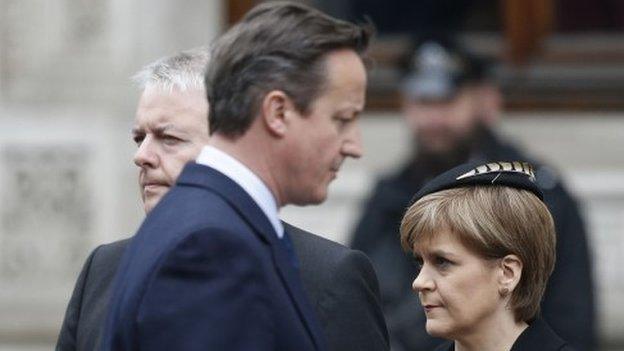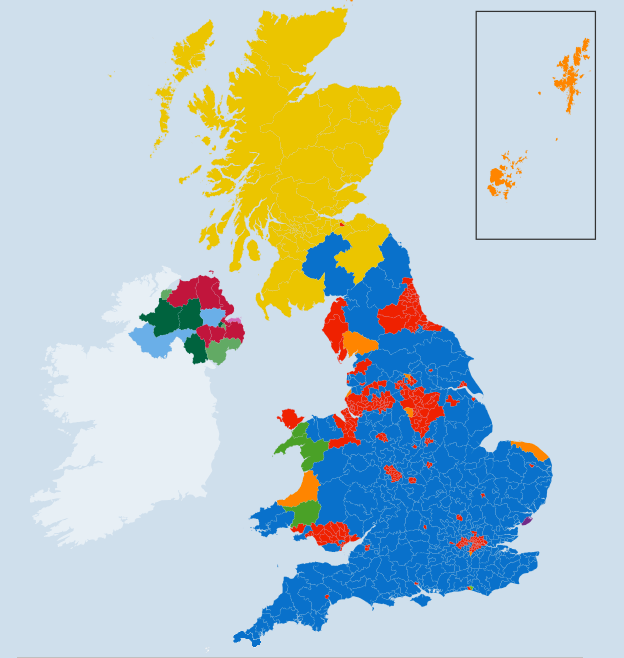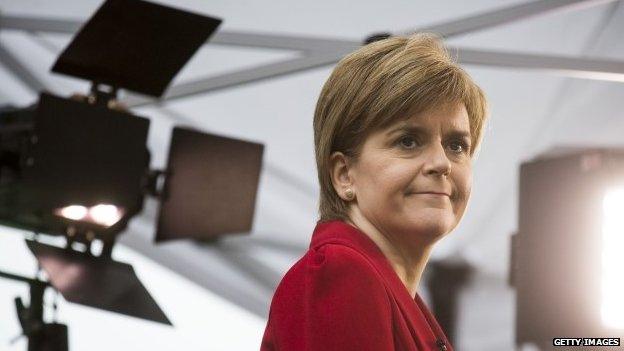Election aftermath: A divided nation
- Published
- comments

David Cameron's greatest challenge is to prevent the union being torn apart by mutual resentment
The question uppermost in the prime minister's mind as he assembles his new government is how to keep the kingdom united.
"Above all I want to bring our country together," he revealed after the result, "to reclaim a mantle we should never have lost - the mantle of one nation, one United Kingdom".
Looking at the political landscape from Land's End today is very different to the view from John O'Groats.
A sea of Conservative and Unionist blue dominates the scene across much of England, while a field of SNP nationalist yellow stretches to the horizon and beyond from the north.
David Cameron's greatest challenge is to prevent the union he supports being torn apart by mutual resentment - resentment from Scotland at a Westminster government dominated by English Tories, and resentment from England at the preferential treatment people think is being given to the Scots.
Those who assumed the future of the Union had been safeguarded by the Scottish referendum must think again.

Conservatives won 331 seats and Labour 232 - followed by the SNP with 56 seats out of 59 in Scotland
The vote created a powerful lobby that couldn't achieve independence in a head to head, but became an almost unstoppable force in multi-candidate constituency elections.
The Conservatives' portrayal of SNP representation at Westminster as the wicked cuckoo in Labour's nest may have helped the party win votes in England.
But it will have added to the sense that Mr Cameron pays scant regard to the wishes of the Scottish electorate.
There are scars that will need to be healed if the Prime Minister's one-nation vision is to become a reality.
No easy answer
No surprise that today he reiterated the vow made to the Scottish people last year - far greater powers over income tax and welfare at Holyrood and a promise to retain the controversial Barnett formula which sets Scottish funding.
But he has yet to win Parliamentary approval for that agreement and some on his own backbenches are known to have reservations about the measures proposed for the Scotland Bill.
His party is much more concerned with what David Cameron today described as "fairness for England" - but the Tories' popular manifesto pledge to introduce 'English votes for English laws' will do nothing to heal the rifts with Scotland, creating, as it does, a system where Scots MPs have less power than their English counterparts at Westminster.

The SNP, led by Nicola Sturgeon, won 56 of the 59 Westminster seats in Scotland
David Cameron will find it difficult to balance his promise to answer the English question with his determination to make the union stronger.
The London mayor and newly-elected Tory MP Boris Johnson argues the prime minister must reach out to the Scots.
"There has to be some sort of federal offer," he told the BBC. "Everybody needs to take a deep breath and think about how we want the United Kingdom to progress."
The problem with a federal UK, however, is that England is so much bigger and more powerful than the other members of such a federation.
There is no easy or obvious answer to how the interests of each corner of the kingdom can be properly reflected and respected.
Britain's largely unwritten constitution has grown up over centuries, constructed like a game of Jenga - pull one block out and you risk the whole edifice collapsing.
If David Cameron means what he says about governing as one nation, he will need to take his time and tread very carefully.